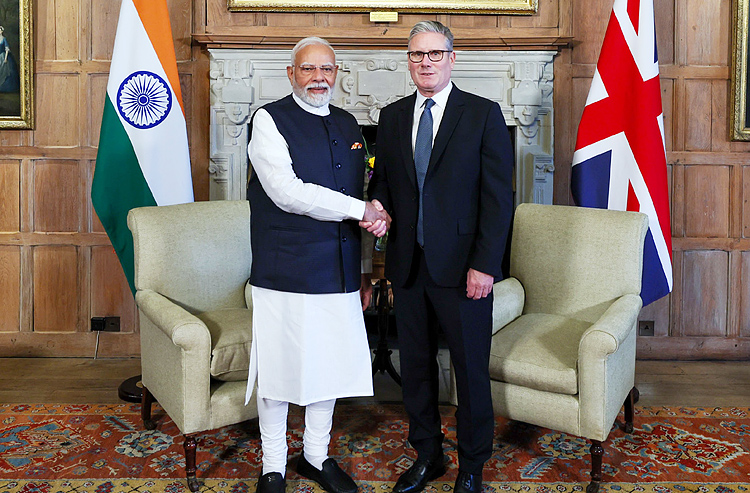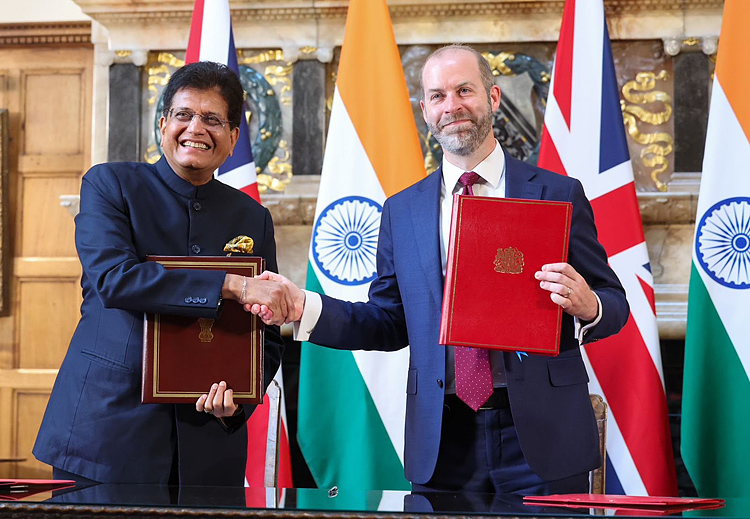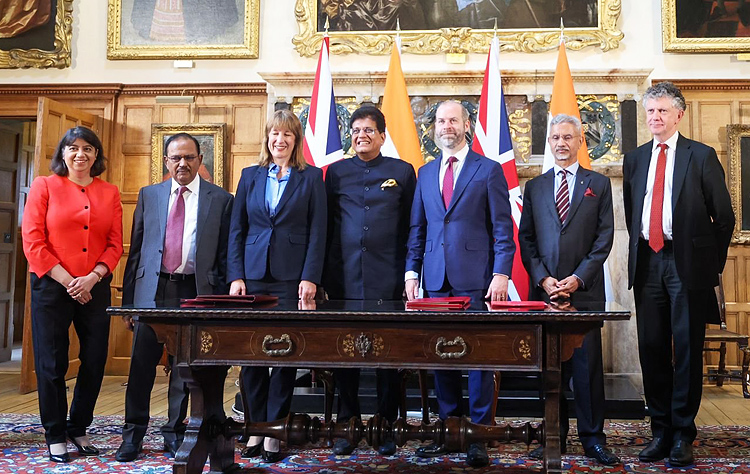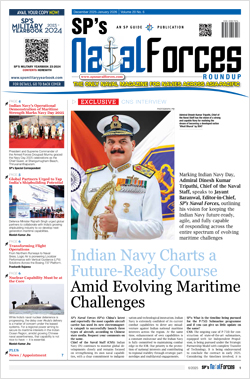INDIAN ARMED FORCES CHIEFS ON OUR RELENTLESS AND FOCUSED PUBLISHING EFFORTS

The insightful articles, inspiring narrations and analytical perspectives presented by the Editorial Team, establish an alluring connect with the reader. My compliments and best wishes to SP Guide Publications.

"Over the past 60 years, the growth of SP Guide Publications has mirrored the rising stature of Indian Navy. Its well-researched and informative magazines on Defence and Aerospace sector have served to shape an educated opinion of our military personnel, policy makers and the public alike. I wish SP's Publication team continued success, fair winds and following seas in all future endeavour!"

Since, its inception in 1964, SP Guide Publications has consistently demonstrated commitment to high-quality journalism in the aerospace and defence sectors, earning a well-deserved reputation as Asia's largest media house in this domain. I wish SP Guide Publications continued success in its pursuit of excellence.
- Global Partners Urged to Tap India's Shipbuilding Potential: Rajnath Singh at Samudra Utkarsh
- All about HAMMER Smart Precision Guided Weapon in India — “BEL-Safran Collaboration”
- India, Germany deepen defence ties as High Defence Committee charts ambitious plan
- G20 Summit: A Sign of Global Fracture
- True strategic autonomy will come only when our code is as indigenous as our hardware: Rajnath Singh
- India–Israel Joint Working Group Meeting on defence cooperation to boost technology sharing and co-development
UK-India Prime Ministers unveil reinvigorated Partnership, ink FTA pact
In a significant moment for international trade and diplomacy, India's Commerce Minister Piyush Goyal and his British counterpart Jonathan Reynolds sign the Free Trade Agreement (FTA) in the presence of Prime Ministers Narendra Modi of India and Keir Starmer of UK.

India-UK Free Trade Agreement
The historic deal is set to boost bilateral trade by an estimated £25.5 billion annually, marking a new pact of cooperation between the two nations.
"Our landmark trade deal with India is a major win for Britain," UK Prime Minister Keir Starmer said.
This ambitious pact not only deepens economic ties but also sets the stage for long-term strategic collaboration under the newly launched UK-India Vision 2035 – a joint roadmap outlining a modern, dynamic partnership for the next decade. Importantly, according to the official statement from the British High Commission, the UK and India's ambitious new vision for 2035 is set to go beyond trade, with renewed mutual commitment to drive innovation. Broadly, it also aims to deepen defence cooperation through a new Defence Industrial roadmap, work together to secure our borders, tackle climate change and nurture educational connections.
Defence is the key to unlocking the bilateral strategic partnership between India and the UK.
Defence is the key to unlocking the bilateral strategic partnership between India and the UK. Prime Minister Keir Starmer has very clearly outlined the greater defence cooperation, which is reflected in the UK's National Security Strategy (NSS). NSS lays down the roadmap: India is a country with which we seek a genuine strategic partnership, reflecting its growing importance in the international system.
While India has procured key defence platforms and systems from the UK in the past, including the M777 being the latest major acquisition, the ongoing deal is expected to set forth momentum for greater collaboration. The potential is wide from combat jet to marine engine co-development in India.

Major economic boost
The UK-India trade deal, years in the making, promises to unlock thousands of skilled jobs, streamline access to markets, and lower tariffs on a wide range of goods and services. From financial services and technology to pharmaceuticals and education, sectors across both nations are expected to benefit.
The ongoing deal is expected to set forth momentum for greater collaboration. The potential is wide from combat jet to marine engine co-development in India.
"This deal represents a bold step forward," said Prime Minister Starmer during a joint press conference at 10 Downing Street. "It will deliver tangible benefits for businesses, create high-quality jobs, and strengthen our global position as innovative, outward-looking economies."
From the market perspective, trade deal offers Indian consumers improved access to British products – from soft drinks and cosmetics to cars and medical devices – as average tariffs will drop from 15 per cent to 3 per cent. The UK already imports £11 billion in goods from India, but liberalised tariffs on Indian goods will make it easier and cheaper for British consumers and businesses to buy Indian products and boost Indian businesses' exports to the UK.
Alongside the trade agreement, both leaders unveiled the UK-India Vision 2035 — a comprehensive framework aimed at expanding collaboration across key areas.
Prime Minister Modi echoed the sentiment, stating, "India and the UK share not only historic ties but a vision for the future. This agreement paves the way for stronger economic, cultural, and technological cooperation. Together, we are building bridges of prosperity."

UK-India Vision 2035
Alongside the trade agreement, both leaders unveiled the UK-India Vision 2035 — a comprehensive framework aimed at expanding collaboration across key areas including:
- Climate and Sustainability: Joint investments in green technologies and clean energy innovation.
- Technology and Innovation: Enhanced cooperation in AI, quantum computing, and digital infrastructure.
- Education and Skills: Expanded student mobility, research partnerships, and mutual recognition of qualifications.
- Security and Global Governance: Closer alignment on regional stability, cybersecurity, and global democratic values.
The Vision 2035 document reflects a shared commitment to a rules-based international order, inclusive growth, and mutual respect. It envisions a "living partnership" – adaptable and resilient in a fast-changing global environment.
A new UK-India Economic and Strategic Partnership Council will oversee the roll-out of key initiatives, monitor progress, and ensure the Vision 2035 goals are met.
A strategic Global partnership
The timing of this agreement is significant. As both countries navigate complex geopolitical landscapes, the reinforced UK-India relationship serves as a counterweight to rising protectionism and instability elsewhere. It also positions the UK and India as natural partners in shaping global standards on trade, digital governance, and sustainable development.
The business communities in both countries have welcomed the agreement enthusiastically. The Confederation of British Industry (CBI) called it "the most significant bilateral trade agreement for the UK in the post-Brexit era," while India's Federation of Chambers of Commerce and Industry (FICCI) hailed it as "transformative for Indian exporters and service providers."
With the ink drying on this historic deal, attention will now turn to implementation. A new UK-India Economic and Strategic Partnership Council will oversee the roll-out of key initiatives, monitor progress, and ensure the Vision 2035 goals are met. It also requires ratification from the British parliament.
India-UK trade deal does mark the beginning of a reinvigorated strategic partnership with a greater potential for opportunity, innovation, and global leadership.
Manish Kumar Jha is a Consulting & Contributing Editor for SP's Aviation, SP's Land Forces and SP's Naval Forces and a security expert. He writes on national security, military technology, strategic affairs & policies.





